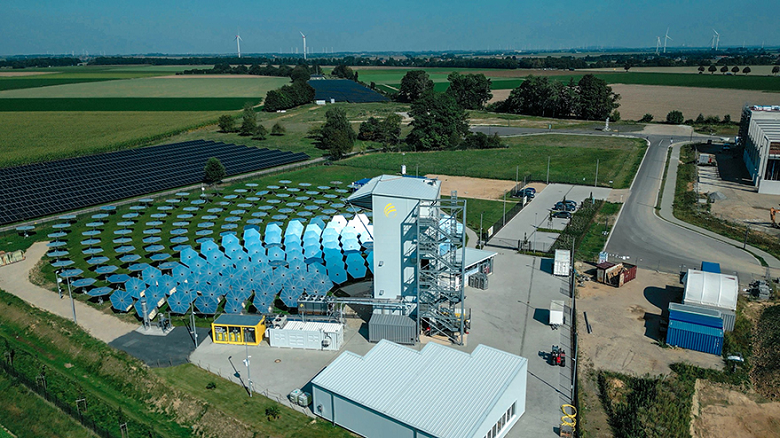Synhelion to build first solar fuel plant in Spain

It will have a production capacity of 1,000 tonnes per year and will be operational by 2027.
The Swiss company Synhelion has announced that Spain will host the world's first plant for introducing its solar fuels to market. This innovative product, designed for long-distance transport and other industries that are difficult to electrify, such as cement manufacturing, is solar-powered and only emits the amount of carbon dioxide used to manufacture it.
The RISE plant, the precise location of which Synhelion has not yet disclosed, will have a production capacity of 1,000 tonnes per year. Construction will start in 2025 and it will be operational by 2027. It will produce solar kerosene for aircraft, sustainable diesel for ships and trucks, and green petrol for motor vehicles.
Pioneer clients
The first clients, who will pioneer these non-fossil fuels, have already signed five-year purchase agreements that will support the investment and development of Synhelion's technology. The first was the Swiss aircraft manufacturer Pilatus Aircraft, which will buy 200 tonnes of solar kerosene produced in Spain, and which has also become a shareholder in the manufacturer.
The Lake Lucerne Navigation Company (SVG), also from Switzerland, will be the first shipping company to use this fuel, after signing a purchase agreement for 100 tonnes per year from 2027. SGV's steamships will thereby continue to form part of the landscape of Lake Lucerne as they have done for over a century, but they will no longer use the coal they initially used or their current fossil fuel, but an alternative produced in Spain. And all this can be achieved without even having to modify their engines.
Large-scale implementation
Synhelion's first industrial-scale plant, called Dawn (pictured), started production in Germany last June with the aim of demonstrating that the technology to produce solar fuels is ready for large-scale application. Although smaller in capacity than RISE, its launch has led to the first agreements being signed.
A 20-metre-high solar tower and a field of mirrors form the most striking part of Dawn. The tower contains a solar receiver, a thermochemical reactor and a thermal energy storage facility that enables cost-effective production of solar fuel 24 hours a day.
Ten-year target
Synhelion was founded in 2016 as a spin-off of ETH Zurich. In 2019 it demonstrated, for the first time, that fuels could be produced using solar heat. Its goal is to reach an annual production volume of around 1 million tonnes of solar fuel in ten years.
Synthetic crude oil is an intermediate product from which certified fuels are processed in a conventional oil refinery. Solar fuels can directly replace fossil fuels and are fully compatible with existing fuel infrastructure, from storage and transport to internal combustion engines and aircraft engines.
Photo: Synhelion




